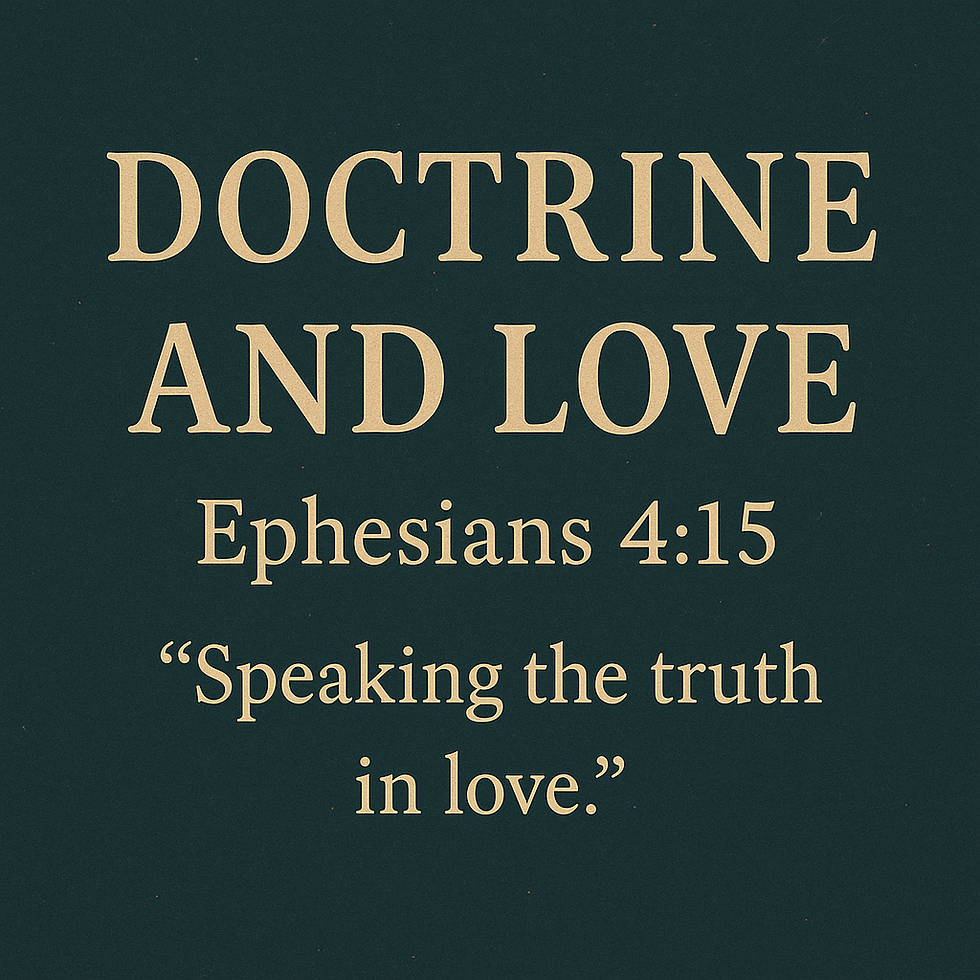Day 1: Doctrine is the Life of the Church
- Corby Davis
- Sep 4, 2025
- 3 min read
Updated: Sep 7, 2025
Scripture:
“All Scripture is inspired by God and profitable for teaching, for reproof, for correction, for training in righteousness, so that the man of God may be equipped, having been thoroughly equipped for every good work.” – 2 Timothy 3:16–17, LSB
Doctrine is not an optional accessory for the church; it is the very lifeblood of her existence. The apostle Paul declares that all Scripture is breathed out by God, and therefore useful for shaping the entire life of the believer and the church. If the Word is God-breathed, then doctrine is God-delivered, not man-invented. The church is not free to create its own beliefs but is bound to proclaim, cherish, and defend what God has spoken.
John Calvin captured this truth well when he wrote, “Scripture is the school of the Holy Spirit, in which, as nothing is omitted that is both necessary and useful to know, so nothing is taught but what is expedient to know” (Institutes, 1.6.3). In other words, doctrine is not a dry set of propositions but God’s chosen means of forming His people into Christlikeness. To despise doctrine is to despise God’s own voice.
Many today pit doctrine against life, claiming that love, community, or service should take priority over theology. But Paul will not allow such a false dichotomy. To Timothy, he insists that doctrine equips the man of God for every good work (2 Tim. 3:17). Far from being abstract, doctrine is intensely practical: it teaches what is true, reproves what is false, corrects what is wrong, and trains what is right.
Louis Berkhof reminds us, “The Christian religion is a life, but it is a life that is rooted in truth. And the systematic statement of that truth is doctrine” (Systematic Theology, p. 21). In other words, no true Christian life exists apart from Christian truth. The church cannot grow in holiness or mission without being rooted in sound doctrine.
Throughout history, whenever the church has flourished, it has been because doctrine was cherished and faithfully taught. The Reformation is the clearest example. Martin Luther and John Calvin did not give Europe a new religious experience; they gave it back the doctrine of justification by faith alone. Truth revived the church, and the Spirit of God used doctrine to bring life where superstition and corruption had reigned.
On the other hand, wherever doctrine has been neglected, churches have declined into error and spiritual deadness. J. I. Packer warned, “Theology is a servant of the church, and a church without theology will soon be a church without Christ” (Knowing God, p. 38). Strong words, but true. Without doctrine, churches are tossed to and fro by every cultural trend and are unable to bear witness to the world with clarity.
This is why Paul told Titus that elders must “hold fast the faithful word which is in accordance with the teaching, so that he will be able both to exhort in sound doctrine and to reprove those who contradict” (Titus 1:9). The health of the church depends on its leaders being tethered to sound doctrine. A doctrinally careless elder will produce a doctrinally careless flock, but a shepherd grounded in the Word will feed the sheep with truth that nourishes eternal life.
Doctrine also safeguards unity. Ephesians 4:13–15 explains that the church matures as it grows in “the unity of the faith and of the full knowledge of the Son of God.” Unity apart from truth is nothing more than a fragile truce, but unity built on doctrine is both durable and God-glorifying. As Joel Beeke observes, “Sound doctrine is the bond of love in the church; it provides the framework within which Christian fellowship flourishes” (Living for God’s Glory, p. 55).
Beloved, if we long to see our churches vibrant, holy, and fruitful, we must begin by treasuring doctrine. A church that sings passionately but believes little will eventually falter. A church that serves generously but abandons biblical truth will ultimately serve in vain. But a church that clings to the God-breathed Word, shaped in all her life by the doctrines of Scripture, will be a pillar and buttress of the truth (1 Tim. 3:15). Doctrine is not merely important; it is essential. It is life.
Personal Reflection
Why do so many people today see doctrine as unimportant or even harmful?
How does 2 Timothy 3:16–17 demonstrate the practical nature of doctrine?
In what ways has sound doctrine shaped your own walk with Christ?
What happens to a church that separates love and service from doctrinal truth?



Comments